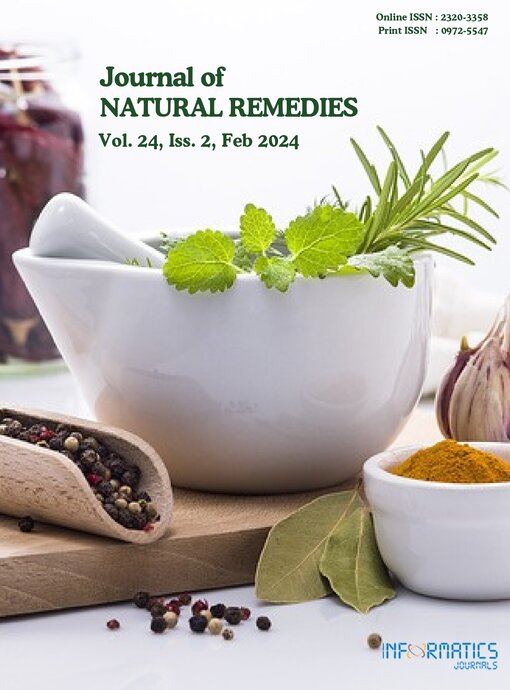Investigation of the Effect of Coconut Palm Sugar on Metabolic Disorders in Experimental Diabetic Rats
DOI:
https://doi.org/10.18311/jnr/2024/35036Keywords:
Diabetes, Coconut Palm Sugar, Experimental Rats, Nicotinamide, StreptozotocinAbstract
Diabetes is a metabolic disorder with many different underlying factors. Humans can develop Type 1 diabetes, which is brought on when the immune system assaults and destroys insulin, and Type 2 diabetes, which can be brought on by several variables, the most important of which is lifestyle, as well as by different genotypes. Due to the presence of polyphenols, which have high antioxidant qualities, Coconut Palm Sugar (CPS) is nutritious and has a good potential for managing diabetes. In this investigation, we took the STZ-Nicotinamide model for diabetes induction. In normal rats (Phase 1) and diabetes-induced rats (Phase 2), After exposure to table sugar and coconut palm sugar, we measured a variety of factors, including body weight, food intake, water consumption, blood sugar level, insulin level, insulin resistance, lipid profile, atherogenic index, and insulin resistance.
Downloads
Metrics
Downloads
Published
How to Cite
Issue
Section
License
Copyright (c) 2024 Shraddha Patel, Archana Navale (Author)

This work is licensed under a Creative Commons Attribution 4.0 International License.
Accepted 2023-10-30
Published 2024-02-01
References
World Health Organization Report: Global Strategy on Diet, Physical Activity, and Health. WHO; 2022.
Mona H, Samar E, Yasser E. Date palm fruit extract ameliorated pancreatic apoptosis, endocrine dysfunction and regulatory inflammatory cytokines in streptozotocin-induced diabetes in rats. Environmental Science and Pollution Research. 2020; 27:43322-39. https://doi.org/10.1007/s11356-020-10262-9 PMid:32737781 DOI: https://doi.org/10.1007/s11356-020-10262-9
Tariq A, Perna S, Mandeel QA, Abdulhadi A, Alsayyad AS, D’Antona G, et al. Effects of daily low-dose date consumption on glycemic control, lipid profile, and quality of life in adults with pre- and Type 2 diabetes: A randomized controlled trial. Nutrients. 2019; 12:217-27. https://doi.org/10.3390/ nu12010217 PMid:31952131 PMCid:PMC7019638 DOI: https://doi.org/10.3390/nu12010217
Mirghani O. Dates fruits effects on blood glucose among patients with diabetes mellitus: A review and meta-analysis. Pakistan Journal of Medical Sciences. 2021; 37:1230-6. https://doi.org/10.12669/pjms.37.4.4112 PMid:34290813 PMCid:PMC8281151 DOI: https://doi.org/10.12669/pjms.37.4.4112
Kayvan K, Karim C, Amirhosein H, Amirhosein Z, Shima T, Nihal E, et al. Adiponectin: Structure, physiological functions, role in diseases, and effects of nutrition. Nutrients. 2021; 13:1180-95. https://doi.org/10.3390/ nu13041180 PMid:33918360 PMCid:PMC8066826
Yeyen M, Rida K, Irma S, Agus R, Teguh K. Identification of macro elements (sucrose, glucose and fructose) and micro elements (metal minerals) in the products of palm sugar, coconut sugar and sugar cane. Advances in Biological Research. 2019; 9:271-4.
Li B, Yan N, Jiang H, Cui M, Wu M, Wang L, et al. Consumption of sugar sweetened beverages, artificially sweetened beverages and fruit juices and risk of Type 2 diabetes, hypertension, cardiovascular disease, and mortality: A meta-analysis. Frontiers in Nutrition. 2023; 10. https://doi.org/10.3389/fnut.2023.1019534 PMid:37006931 PMCid:PMC10050372 DOI: https://doi.org/10.3389/fnut.2023.1019534
Islam MA, Alam F, Solayman M, Khalil MI, Kamal MA, Gan SH. Dietary phytochemicals: Natural swords combating inflammation and oxidation-mediated degenerative diseases. Oxidative Medicine and Cellular Longevity. 2016; 2016:1- 25. https://doi.org/10.1155/2016/5137431 PMid:27721914 PMCid:PMC5046019 DOI: https://doi.org/10.1155/2016/5137431
Solayman M, Ali Y, Alam F, Islam MA, Alam N, Khalil MI, et al. Polyphenols: Potential future arsenals in the treatment of diabetes. Current Pharmaceutical Design. 2016; 22:549- 65. https://doi.org/10.2174/1381612822666151125001111 PMid:26601968 DOI: https://doi.org/10.2174/1381612822666151125001111
Alam F, Islam MA, Mohamed M, Ahmad I, Kamal MA, Donnelly R, et al. Efficacy and safety of pioglitazone monotherapy in Type 2 diabetes mellitus: A systematic review and meta-analysis of randomised controlled trials. Scientific Reports. 2019; 9:1-13. https://doi.org/10.1038/s41598-019-41854-2 PMid:30926892 PMCid:PMC6441028 DOI: https://doi.org/10.1038/s41598-019-41854-2
Alam F, Islam MA, Kamal MA, Gan SH. Updates on managing Type 2 diabetes mellitus with natural products: Towards antidiabetic drug development. Current Medicinal Chemistry. 2018; 25:5395-431. https://doi.org/10.2174/0929867323666160813222436 PMid:27528060 DOI: https://doi.org/10.2174/0929867323666160813222436
Cory H, Passarelli S, Szeto J, Tamez M, Mattei J. The role of polyphenols in human health and food systems: A mini-review. Frontiers in Nutrition. 2018; 5:1-9. https://doi.org/10.3389/fnut.2018.00087 PMid:30298133 PMCid:PMC6160559 DOI: https://doi.org/10.3389/fnut.2018.00087
Simatupang R. The effect of provision of cherry leaves booked water on the reduction of blood sugar levels in Type 2 diabetes mellitus patients. Science Midwifery. 2023; 10:4488-93.
Meng P, Li Q, Shi R, Chang J, Chang H, Li M. Food supplements could be an effective improvement of diabetes mellitus: A review. Journal of the Science of Food and Agriculture. 2021; 1:67-81. https://doi.org/10.1016/j.jfutfo. 2021.09.003 DOI: https://doi.org/10.1016/j.jfutfo.2021.09.003
Neelakantan A, Park S, Chen G, Dam R. Sugar-sweetened beverage consumption, weight gain, and risk of Type 2 diabetes and cardiovascular diseases in Asia: A systematic review. Nutrition Reviews. 2021; 80:50-67. https://doi. org/10.1093/nutrit/nuab010 PMid:33855443 DOI: https://doi.org/10.1093/nutrit/nuab010
Ananda PK, Kumarappan CT, Christudas S, Kalaichelvan VK. Effect of Biophytum sensitivum on streptozotocin and nicotinamide-induced diabetic rats. Asian Pacific Journal of Tropical Biomedicine. 2012; 2(1):31-5. https://doi.org/10.1016/S2221-1691(11)60185-8 PMid:23569830 DOI: https://doi.org/10.1016/S2221-1691(11)60185-8

 Shraddha Patel
Shraddha Patel









 0.35
0.35 24
24 0.161
0.161